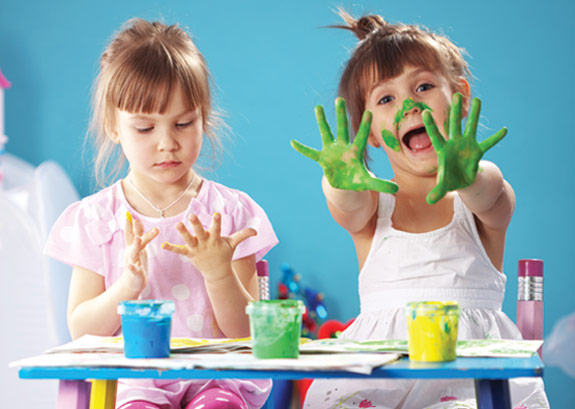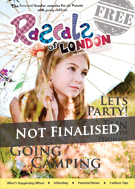The Importance of Messy Play
By Isabelle Parasram

My children have all spent the first 5 years of their lives at school or Nursery almost constantly playing and…guess what? I was furious about it! If, like me, you have memories of education being all about learning by rote, sitting at a desk studiously learning the three R’s and being tested on your competence by written exams, you may be shocked to discover that times have changed!
t was not until I completed my early years training that I began (and I really mean began) to understand the concept of learning through play. Even now that I am a total convert, I still panic every so often and whip out everything from my old school armory – recitations, drills and repetitive exercises.
Deep down, though, although I am really grateful for the military style education I had, which filled my head with knowledge, I would much rather my children were equipped with skills, practical application and the ability to translate their knowledge from one field to another – something that happens much more effectively when they learn through play.
I have had a mixed experience of education, having been based both in the UK and in Trinidad. Most of my education was in an all girls competitive system in which I was usually top of a very clever class. There was absolutely no time for play in my home life and no hope of it at school. It suited my Alpha personality really well and has lead to an endless array of exam certificates and considerable career success.
However, when I look at my four very different children, I realise that, given their hugely different personalities and learning preferences, the likelihood of producing another me is just about zero – and that’s possibly a good thing.
The problem with the way in which I was educated is that it was really well suited to those who naturally blossom through discipline and regimes, but it left out those who dared to learn in any other way.
In this modern age of diversity where I, as an assessor, am myself judged by how well I adapt my assessment of NVQ 2 and 3 learners to suit their individual learning styles, it may make perfect sense to expect your child to be presented with a variety of learning techniques. What many parents/carers don’t seem to realise, though, is that, for under-fives, the key method of learning is through play.
So why are we so concerned when it seems that our child has spent the day ‘just playing’ at school, Nursery or with our childminder? I think it’s because learning through play does not give us, as parents/carers, any measurable or instantaneous proof that our child is actually learning.
I feel very satisfied when my 3 year old can recite his times tables, but realise that this feeling is misplaced when he cannot extend that knowledge: ‘Zac, if one two is two, what is one fourteen?’ Answer: ‘I don’t know.’ I am thrilled when my 8 year old gets 100% in her spelling test, but can see that she hasn’t really grasped the underlying concepts when her freestyle composition is full of spelling mistakes of the words from her test. My experience has taught me that these foundations are useful and do fall into place eventually – indeed, the times tables will be excellent grounding for when Zac actually has to use them when he’s older – but, I also have to ensure that the children actually learn as well as accumulate knowledge.
Take my five year old. One month ago, he could not read. He was one of the lowest achievers in his class, if not the lowest ‘ranking’ Then…Mrs Baptist - a fantastic teacher - came into his life and began working with me as well as with him. Now, Carl’s homework partly consists of me playing the game of ‘Snap’ with words he finds tricky. We also play ‘Lotto’ with words and letters he doesn’t recognise easily. I have also started to play ‘Eye Spy’ with the foundational phonemes – ‘s’, ‘a’, ‘t’, ‘p’, ‘I’ and ‘n’. Every day he plays games from the CBeebies website and every Sunday, we have been going to the London museums just to play in their children’s ‘pods’ which are truly rich learning environments.
If you’ve read my other articles, you’ll know that I incorporate teaching into my children’s everyday lives through fun and play and that the foundational stuff will always be important to me, but, even for me, there are times when I go off track and it takes a teacher like Mrs Baptist to re-inspire me.
Sowing into a child’s life is almost purely an act of faith. You put a load of things in and hope that, eventually, something good will come out. When, this month, Carl began to recognise words, it was completely breathtaking for me. But it took five years of a relationship between Carl, books and me to hear those golden words come out of his mouth and, in all that time, I had no idea whether my efforts would bear any fruit whatsoever!
So, keep persisting! Research has shown that young children learn to think, socialise and develop on every level through doing and talking and this is exactly what playing is.
An example of learning through play: Your daughter decides to organise a small-scale train layout at Nursery. In doing this, you might simply see your daughter and a Nursery Nurse ‘messing about with the train set’, whilst another Nursery Nurse has a break doing paperwork. What I might see, in looking at the same scenario is a Nursery Nurse engaging with your daughter, ‘scaffolding’ her learning and asking pertinent questions of her designed to provoke thought, whilst the other Nursery Nurse observes your child closely, noting down what interests her, what she is learning and what the next steps in her learning should be.
I would look at your daughter playing and seeing her:
• creating a world of her own in which she can act out her understanding of the real world
• making choices and directing outcomes
• becoming skilful with her fingers as she manipulates small objects
• planning, organising and taking charge
• forming mathematical concepts of sets as she sorts the shorter trains from the longer trains
In a few years’ time, this type of play ‘seed’ would lead to ‘fruit’ you might never have imagined. For example, had I known that if I had let Carl play with small objects such as Lego more often, he would have found it easier to start writing at school, because he would have developed fine motor skills to a greater extent than he has done.
The fact that Jemima and I played with bananas as pretend phones taught her how to represent a phone using another object. She then translated that fundamental understanding of re-presentation to grasp the fact that a letter on a page written with a pen can also represent a sound coming from her mouth.
My one year old, Theo, spends long periods of time emptying boxes, then refilling them. We provide such activities for the children of his age at Nursery and, although this might seem to be a pointless activity, Theo is learning a
multitude of lessons that his little mind is
storing away as a blueprint for future learning:
‘Rubbing 2 items together can create a sound!’ – friction
‘A small thing can fit into a big thing!’ – long division
‘Things that are the same go together!’ – mathematical sets/patterns
‘When the box is full, I can’t fit anything else in!’ – capacity/volume
‘When I build the blocks, they sometimes fall down!’ – action and reaction
If you want to encourage your own child to learn through play, here are a few ideas that we use at home:
1.Cooking – through which Jemima learns how to measure in metric.
2.Putting away the cutlery (this is technically housework, but, as my children think it’s fun, why spoil a good thing?!) – through this Carl learns the basis for multiplication and long division by sorting the spoons, forks and knives into separate compartments.
3.Sewing together a play puppet (2 in a pack from Wilkinson’s for £1!) – through this, Zac is developing the fine motor skills that he will need to be able to use a computer mouse.
4.Playing peek-a -boo with Theo – through which Theo learns the theory of object permanence… crucial for grasping the idea of an abstract concept in the classroom.
Learning through play is not
complicated, it’s simply about
learning in a fun way without your
child noticing, recognising the value
of the activity they are doing and, if
you can, linking it to learning in a
non-overt way.
And, one last thing to remember…as a parent/carer, learning through play should be just as much fun for you as it is for your child, so choose activities you can both enjoy, after all, you’ll be doing it for at least five years!
Isabelle Parasram is the mother of four children aged 1-8. She is also a barrister, an AVA College Assessor of Childcare and Education, an NCT- trained antenatal teacher, the Director of a large children’s day Nursery & Out of School Club in Tower Hill and is a Trustee of a Community Nursery in Shadwell.




